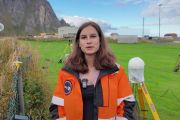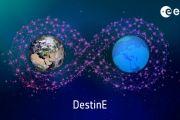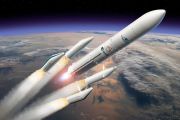
Copernical Team
New ESA gravity mission to detect weakening ocean conveyor

At the Living Planet Symposium, attendees have been hearing how ESA’s Next Generation Gravity Mission could provide the first opportunity to directly track a vital ocean circulation system that warms our planet – but is now weakening, risking a possible collapse with far-reaching consequences.
EU's Space Act would track space objects and clear satellite debris
 The European Commission made a proposal Wednesday to clean up Europe's space sector while also reducing its footprint and making sure its satellites are better protected from hackers.
In a press release, the commission said it wants to enact the EU Space Act, which it describes as a "new set of ambitious measures to make Europe's space sector cleaner, safer and more competitive in Europ
The European Commission made a proposal Wednesday to clean up Europe's space sector while also reducing its footprint and making sure its satellites are better protected from hackers.
In a press release, the commission said it wants to enact the EU Space Act, which it describes as a "new set of ambitious measures to make Europe's space sector cleaner, safer and more competitive in Europ Muon Space Expands Earth Imaging Capabilities with Launch of Hydrosat Thermal Mission
 Muon Space has successfully launched Hydrosat's VanZyl-2 satellite, the latest in a series of missions built on its custom-designed Halo platform. Deployed aboard SpaceX's Transporter-14 mission from Vandenberg Space Force Base, the spacecraft established contact just six minutes after deployment and is now undergoing commissioning.
VanZyl-2 carries advanced multispectral and thermal infra
Muon Space has successfully launched Hydrosat's VanZyl-2 satellite, the latest in a series of missions built on its custom-designed Halo platform. Deployed aboard SpaceX's Transporter-14 mission from Vandenberg Space Force Base, the spacecraft established contact just six minutes after deployment and is now undergoing commissioning.
VanZyl-2 carries advanced multispectral and thermal infra New exoplanet discovery reveals rare gas giant through global citizen science effort
 A collaborative team of astronomers led by The University of New Mexico has confirmed a rare gas giant exoplanet, TOI-4465 b, located about 400 light-years from Earth. The discovery was enabled by a worldwide network of citizen scientists and detailed in The Astronomical Journal, with UNM Postdoctoral Fellow Zahra Essack as lead author and Assistant Professor Diana Dragomir as co-author.
T
A collaborative team of astronomers led by The University of New Mexico has confirmed a rare gas giant exoplanet, TOI-4465 b, located about 400 light-years from Earth. The discovery was enabled by a worldwide network of citizen scientists and detailed in The Astronomical Journal, with UNM Postdoctoral Fellow Zahra Essack as lead author and Assistant Professor Diana Dragomir as co-author.
T James Webb reveals sub-Saturn mass exoplanet in young star system
 The James Webb Space Telescope (JWST) has directly imaged a previously unknown exoplanet, marking a significant milestone since the telescope's launch in 2022. Led by a CNRS researcher at the Observatoire de Paris-PSL and Universite Grenoble Alpes, the discovery was enabled by a coronagraph developed in France and installed on JWST's MIRI instrument.
This technology, created through a CNRS
The James Webb Space Telescope (JWST) has directly imaged a previously unknown exoplanet, marking a significant milestone since the telescope's launch in 2022. Led by a CNRS researcher at the Observatoire de Paris-PSL and Universite Grenoble Alpes, the discovery was enabled by a coronagraph developed in France and installed on JWST's MIRI instrument.
This technology, created through a CNRS Halogen clues shed light on lunar crust evolution
 Rocks from the Moon's near side hold unexpectedly high levels of chlorine, offering fresh insights into the processes that shaped the lunar crust. An international team led by the University of Munster, alongside Ehime University in Japan and Vrije Universiteit Amsterdam, conducted lab-based simulations of lunar rock formation to explore how chlorine behaves under lunar conditions.
Their e
Rocks from the Moon's near side hold unexpectedly high levels of chlorine, offering fresh insights into the processes that shaped the lunar crust. An international team led by the University of Munster, alongside Ehime University in Japan and Vrije Universiteit Amsterdam, conducted lab-based simulations of lunar rock formation to explore how chlorine behaves under lunar conditions.
Their e Perseverance reveals clay minerals and sets distance record in Martian exploration
 NASA's Perseverance rover has completed its 30th abrasion study, drilling into a Martian rock named "Kenmore" to uncover geologic secrets beneath its dusty surface. On June 3, the rover abraded a two-inch-wide patch, then cleared debris with a nitrogen-powered device known as the gaseous Dust Removal Tool (gDRT), which delivers five puffs per operation. This technique enables scientists to exami
NASA's Perseverance rover has completed its 30th abrasion study, drilling into a Martian rock named "Kenmore" to uncover geologic secrets beneath its dusty surface. On June 3, the rover abraded a two-inch-wide patch, then cleared debris with a nitrogen-powered device known as the gaseous Dust Removal Tool (gDRT), which delivers five puffs per operation. This technique enables scientists to exami Desert lichen offers new evidence for the possibility of life on other planets
 The question of whether Earth is alone in harboring life has captivated humanity for millennia. In recent years, scientists have turned to Earth-like planets in other solar systems that may show the most promise, but many revolve around stars that emit much stronger solar radiation than our own. Now, a new study offers evidence that life as we know it may be able to thrive on those Earth-like ex
The question of whether Earth is alone in harboring life has captivated humanity for millennia. In recent years, scientists have turned to Earth-like planets in other solar systems that may show the most promise, but many revolve around stars that emit much stronger solar radiation than our own. Now, a new study offers evidence that life as we know it may be able to thrive on those Earth-like ex Growing Homes On Mars: TAMU Research Pioneers Autonomous Construction Using Synthetic Lichens
 Inhabiting Mars has long been a futuristic fantasy fueled by science fiction. However, successful landings on our neighboring planet over the past half-century have made this seemingly far-fetched idea increasingly plausible.
But don't start packing just yet. First, we must figure out how to build structures millions of miles from Earth. Sending rockets carrying massive payloads of constru
Inhabiting Mars has long been a futuristic fantasy fueled by science fiction. However, successful landings on our neighboring planet over the past half-century have made this seemingly far-fetched idea increasingly plausible.
But don't start packing just yet. First, we must figure out how to build structures millions of miles from Earth. Sending rockets carrying massive payloads of constru US Radar Test Marks Milestone in Missile Threat Detection Capabilities
 Lockheed Martin and the Missile Defense Agency (MDA) have completed a pivotal test of next-generation radar technology during Flight Test Other-26a (FTX-26a), confirming a major advancement in US homeland defense.
The Long Range Discrimination Radar (LRDR), developed by Lockheed Martin, successfully detected, tracked, and discriminated a live ballistic missile threat amid challenging condi
Lockheed Martin and the Missile Defense Agency (MDA) have completed a pivotal test of next-generation radar technology during Flight Test Other-26a (FTX-26a), confirming a major advancement in US homeland defense.
The Long Range Discrimination Radar (LRDR), developed by Lockheed Martin, successfully detected, tracked, and discriminated a live ballistic missile threat amid challenging condi 




























